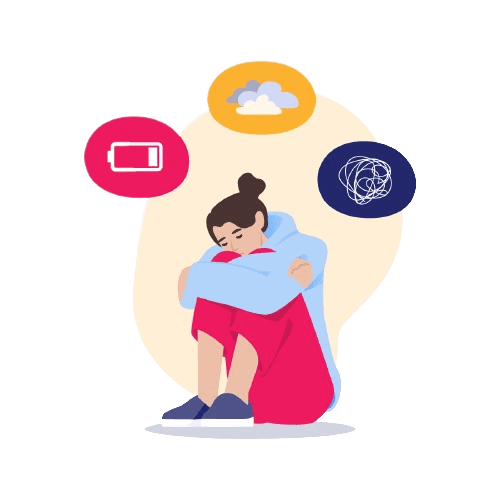OCD Assessment
3 Min Free OCD Assessment
What is OCD?
OCD stands for Obsessive-Compulsive Disorder. It is a mental health condition characterized by recurring thoughts (obsessions) and repetitive behaviors (compulsions) that individuals feel compelled to perform. These obsessions and compulsions can significantly interfere with daily life and cause distress.
Obsessions are intrusive and unwanted thoughts, urges, or images that occur repeatedly in a person’s mind. These thoughts are often disturbing or distressing and can involve fears of contamination, doubts about safety or security, a need for symmetry or order, aggressive or taboo thoughts, or excessive concern with religious or moral ideas.

Symptoms of OCD
The symptoms of depression can vary from person to person, but they often include:
- Intrusive thoughts
- Fear of contamination
- Checking rituals
- Symmetry and orderliness
- Counting and repeating
- Hoarding
- Rituals and routines
- Need for reassurance
- Distress and interference

Who Can Benefit From This OCD Assessment?
The OCD assessment can benefit individuals who suspect they might be experiencing symptoms of Obsessive-Compulsive Disorder (OCD). It is also valuable for those who want to gain a better understanding of OCD or provide support to someone with potential OCD symptoms. The assessment helps identify common signs such as intrusive thoughts, compulsive behaviors, and the impact of these symptoms on daily life.
By recognizing these patterns, individuals can seek appropriate professional help, receive an accurate diagnosis, and explore treatment options. Additionally, the assessment can educate friends, family members, or caregivers, enabling them to offer informed support and understanding to someone with OCD symptoms.
Types of OCD Assessment
Symptom-based assessment:
This type focuses on evaluating specific symptoms and their severity, such as intrusive thoughts, compulsions, checking behaviors, or hoarding tendencies.
Functional impairment assessment:
This assesses the impact of OCD symptoms on various areas of daily functioning, including work, relationships, social activities, and overall quality of life.
Anxiety and distress assessment:
This evaluates the level of anxiety, distress, and emotional turmoil caused by obsessions and compulsions, as well as the individual’s ability to cope with these feelings.
Insight and resistance assessment:
This measures the individual’s awareness and understanding of their OCD symptoms, as well as their level of resistance or ability to resist engaging in compulsive behaviors.
Trigger identification assessment:
This helps identify specific triggers or situations that exacerbate OCD symptoms, allowing for targeted treatment and coping strategies to be developed.
Treatment history assessment:
This involves assessing the individual’s history of previous treatments, including therapy approaches and medication, to determine the effectiveness and inform future treatment decisions.
Treating OCD
Obsessive-Compulsive Disorder (OCD) can be effectively treated through a combination of therapy, medication, and self-help strategies. Here are some common approaches used in the treatment of OCD:
- Cognitive-Behavioral Therapy (CBT): CBT is the primary treatment for OCD. It involves working with a therapist to identify and challenge negative thought patterns and beliefs that drive obsessions and compulsions. Exposure and Response Prevention (ERP) is a specific type of CBT that gradually exposes individuals to their fears or triggers and helps them resist engaging in compulsive behaviors. CBT helps individuals develop healthier coping mechanisms and reduce anxiety associated with OCD.
- Medication: Selective Serotonin Reuptake Inhibitors (SSRIs), a type of antidepressant medication, are often prescribed for OCD treatment. These medications help regulate serotonin levels in the brain and can reduce the severity of OCD symptoms. It’s important to work closely with a psychiatrist to find the right medication and dosage that suits individual needs.
- Support Groups: Joining support groups or engaging in therapy groups with others who have OCD can provide a sense of community, understanding, and shared experiences. Sharing challenges, strategies, and successes with others can be beneficial in managing OCD symptoms.
- Lifestyle Modifications: Engaging in stress-reducing activities like exercise, relaxation techniques (such as deep breathing or meditation), and maintaining a balanced and healthy lifestyle can support overall well-being and help manage OCD symptoms.
- Self-Help Strategies: Learning self-help techniques like recognizing triggers, practicing mindfulness, and challenging intrusive thoughts can complement professional treatment. Self-help resources, books, and online programs specifically designed for OCD can provide additional guidance and support.
It’s important to note that OCD is a chronic condition, and individual treatment plans may vary. It’s recommended to seek professional help from a mental health provider experienced in treating OCD to create a personalized treatment plan that suits your specific needs.

